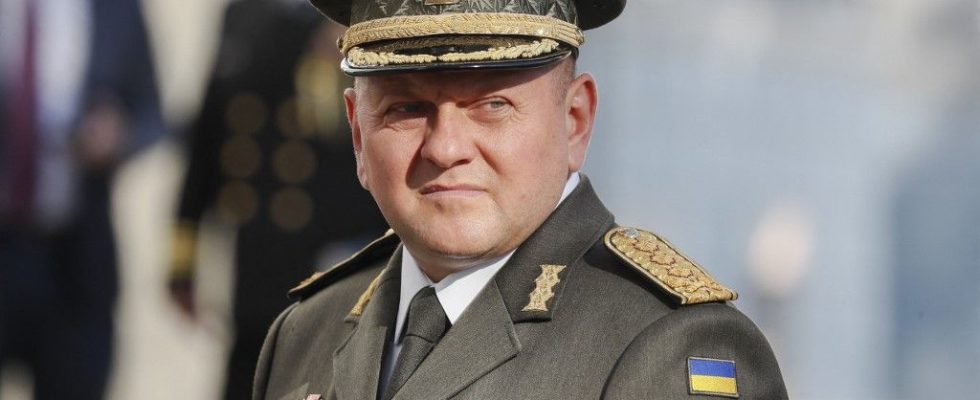For Ukraine, it may be time for disillusionment. And they come from the highest levels of the military. In an interview with the American weekly The Economistand published Wednesday, November 1, General Valeri Zalouzhny, chief of staff of the Ukrainian army, does not speak wooden language.
At the helm of the counter-offensive launched against the Russian army last June, the “iron general”, as his peers nickname him, recognizes the “impasse” his men are faced with. “The war is now moving to a new stage”: the war of positions, which means that the conflict is getting bogged down and the soldiers are struggling to gain ground.
A war of positions: blessings for Russia
However, for Valeri Zalouzhny, there is no doubt about it. This type of war will “benefit Russia” which has suffered heavy losses and wasted much ammunition in recent months. “This will allow it to rebuild its military power, ultimately threatening the Ukrainian armed forces and the state itself,” predicts the chief of staff. Because the greatest risk of a war of positions, of attrition, is “that it could last for years and exhaust Ukraine”.
If the general can boast of having pushed the Russian army back some 17 kilometers, he does not have high hopes for the probability of a “deep and beautiful breakthrough” in Crimea. Especially since kyiv had given itself four months to reach Sevastopol. However, its soldiers today find themselves stuck in minefields east of Bakhmut, and military equipment supplied by the West is regularly destroyed by Russian drones.
The senior officer also does not hesitate to admit his mistakes, and expresses the doubts which could sometimes have led him to make the wrong decisions. “At first I thought there was something wrong with our commanders, so I changed some of them. Then I thought maybe our soldiers weren’t cut out for that, so I “I moved soldiers in certain brigades,” says General Zalouzhny.
But according to him, the major pitfall was thinking of being able to disorganize the Russian army by bleeding its troops dry. “Russia lost at least 150,000 soldiers. In any other country, such losses would have stopped the war.” But not in Russia, where life is cheap. In the eyes of Vladimir Putin, what are 150,000 souls worth compared to the tens of millions of losses suffered during the first two world wars?
Waging electronic warfare…
By plunging his nose into old military books, General Valeri Zalouzhny understands that, like the First World War, “the level of our technological development today has plunged us and our enemies into a stupor. ” And faced with the assessment he draws up almost five months after the launch of the counter-offensive, the soldier declines in The Economistfive “priorities” which, according to him, will allow the Ukrainian army to reverse the balance of power.
Top of the list: regain control of the skies. “Russia’s air defense systems are increasingly preventing our planes from flying,” he explains, pleading to make drones a centerpiece of the Ukrainian counter-offensive.
Especially since Russian machines “have taken over a large part of the role of manned aviation in terms of reconnaissance and air strikes”. All the more reason, according to him, to use “decoys and attack drones to overload Russia’s air defense systems” and “track down Russian drones using our own hunter drones equipped with nets” .
In short, switching to electronic warfare, also resorting to jamming communication and navigation signals. The only problem is that for decades, Russia has continued to modernize its forces, notably by creating a new branch of its army and sixty new types of equipment. This is why Valeri Zalouzhny is now calling for better access to his allies’ electronic intelligence.
…without neglecting human resources
“We must improve in the conduct of electronic warfare from our drones, over a wider range of radio frequencies, while avoiding the accidental suppression of our own drones,” insists the chief of staff, who identifies at the same time the need to “defeat enemy artillery” which has significantly improved in recent years.
With more than 15 years of experience in the army, Valeri Zalouzhny also proposes accelerating the development of mine breaching technology. “When we enter minefields, Russia quickly resupplies them by firing new mines from a distance,” he notes, before concluding: “We need radar-type sensors that use invisible light pulses to detect mines in the ground and smoke projection systems to conceal the activities of our demining units.”
Finally, if war tends to become digital, the chief of staff does not minimize the importance of human resources, and even pleads for a strengthening of soldier reserves. And while recognizing the limits of Ukraine, which is struggling to “form reserves” on its own territory, Valeri Zalouzhny insists on the need to “resolve these problems”.
“We have set up a unified register of candidates, and we must expand the category of citizens who can be called for training or mobilization,” he explains. And to announce having established a “combat course”, which consists of placing newly mobilized and trained personnel in experienced front-line units to prepare them.
